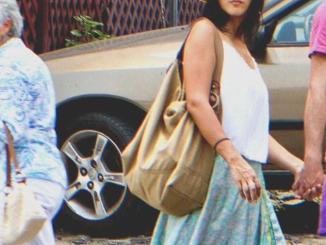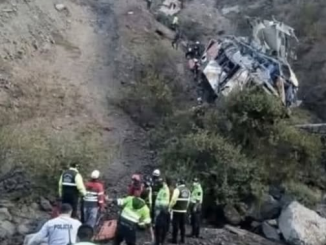
The only thing I could do was watch from the curb as everything inside burned—photos, books, my late husband’s old flannel coat. I kept holding my dog’s collar, telling her it was okay, even though I didn’t believe it myself.
They told me not to get my hopes up. That the fire moved fast. That even if the cat had found a place to hide, the smoke likely got there first.
But then, through the haze and shouting, I saw one of the firefighters walking toward me.
He had something small and gray cradled in his arms.
My knees nearly buckled.
It was my cat. Wet, coughing, and furious—but alive.
The firefighter handed her to me gently.
And just like that, for a moment, nothing else mattered. Not the house. Not the burned memories. Not the hollow ache in my chest from watching my life go up in flames. Just her tiny, angry heart still beating in my arms.
I whispered thank you, over and over. He just nodded and walked back into the smoke like some quiet guardian. I never even caught his name.
I sat on the sidewalk with Mister Boots and Honey, my dog, both trembling against me. We must’ve looked like a mess. But we were a living mess. And in that moment, it felt like enough.
The days that followed were a blur of paperwork, temporary housing, phone calls, and that strange empty sensation of not having “a place” anymore. It’s a weird thing, how you think home is just a roof and walls. But when that’s gone, you realize home is also smell and sound and routine. I kept reaching for doorknobs that weren’t there anymore.
People were kind. They brought casseroles, old blankets, extra clothes. My niece started a GoFundMe. Neighbors I barely knew came by with care packages. It was the kind of kindness you forget still exists in this world.
But rebuilding isn’t just about money or bricks. It’s about letting go of what was and deciding, piece by piece, what comes next.
And yet, the strangest part of it all didn’t happen until months later.
See, Mister Boots—my cranky, opinionated, and fiercely independent cat—had never been a “people” cat. She tolerated me. She ruled over Honey with a velvet paw and zero patience. But she didn’t cuddle. She didn’t come when called. She had been my husband’s cat, really. After he passed, she stayed because I fed her, not because she liked me all that much.
But after the fire… she changed.
She started sleeping next to me every night, curled up against my side like a little furnace. She followed me around the temporary apartment like a shadow. She’d sit beside me on the couch, reach out with one paw, and rest it gently on my hand as if to say, “I’m still here too.”
It was comforting and also, somehow, unsettling.
Then came the phone call.
We all thought that was just Mae being Mae—until the hospice nurse called me last week, whispering that something strange happened the night Grandma passed.
She said Mister Boots wouldn’t come near the bed.
He just sat at the window all night, staring at the same empty patch of sky.
And then, at 3:14 AM, when my grandmother took her last breath, the cat let out a sound none of us had ever heard. A low, drawn-out mewl. Almost like a mourning chant.
Then he turned and walked away.
The nurse said she’d seen animals act strangely before, but never like that. It was as if Mister Boots knew.
I didn’t know what to make of it. Mister Boots had always been indifferent to everyone but me—and barely that. But I remembered something my husband once told me before he died. We were sitting on the porch, wrapped in a shared blanket, and he said, “That cat’s not just a cat, you know. Sometimes I think she sees things we can’t.”
Back then, I laughed. Now I wasn’t so sure.
A few days after Grandma Mae passed, we buried her under the willow tree behind my cousin’s farmhouse, just like she wanted. The sky that day was the color of steel wool, but it didn’t rain. It just… held its breath.
As we stood there, I looked down and noticed Mister Boots had followed me. She sat on the edge of the gathering, just watching. When everyone went back inside for sandwiches and coffee, she stayed. I stayed too.
I sat on the cold ground beside her and whispered, “Did you know it was time?”
She didn’t answer, of course. But she laid her paw on the dirt over Mae’s grave and stayed that way for almost an hour.
After that day, I started to think maybe there was more to Mister Boots than I ever gave her credit for.
But that’s not even the real twist.
The real twist came three weeks later when I was finally moving into the new house my niece helped me find. It was smaller, humbler, but sweet and bright. Big windows, lots of sun spots for Mister Boots. A little backyard where Honey could sniff around.
I had barely unpacked when a knock came on the door.
It was the firefighter.
The same one who had walked out of the flames holding my cat. I recognized his eyes instantly, even without the helmet.
He smiled and held up a cardboard box. “I think this belongs to you.”
Inside the box were a few charred photo albums, one surviving mug, and—miraculously—my husband’s old flannel coat. Singed on the edges, but still there. Still his.
“I went back the next day,” the firefighter said. “Didn’t feel right leaving it behind.”
I invited him in for coffee, heart pounding in that weird way you can’t quite explain. We talked for hours. About the fire. About loss. About the strange little signals the world gives us if we’re quiet enough to notice.
His name was Nathan. He had a quiet voice and the kind of laugh that sneaks up on you. He’d lost someone too. His brother, a few years back. Also in a fire.
That night, as he left, he knelt down to pet Mister Boots. She didn’t flinch. Didn’t back away. She leaned into his hand and purred.
“She doesn’t usually do that,” I said.
He looked up and smiled. “I think she remembers me.”
We started seeing each other after that. Slowly. Hesitantly. Like two people who had once been burned and were still testing the warmth of the world.
Months passed.
The seasons changed.
Mister Boots grew older, thinner, sleepier. Her once-sharp meows softened into quiet chirps. But she never left my side.
And then, one afternoon in late spring, she climbed onto the windowsill, stared outside for a long time, and laid down without making a sound.
She never got up again.
I buried her beside the willow tree, not far from Mae.
Honey sat next to me the whole time, head on my knee.
Nathan brought a little stone with her name etched into it. We planted lavender around it, her favorite sunbathing spot.
I miss her every day. I miss the way she made the house feel watched over. The way her eyes always seemed to be listening.
Sometimes, late at night, I think I hear her paws padding across the floor. But when I turn, there’s nothing there.
And yet, it still feels like home.
Nathan moved in this summer. He brings me coffee in bed, wears my husband’s old coat when he takes Honey on walks. He asked if that was weird, wearing something that belonged to someone I loved. I told him love isn’t a competition—it’s a legacy.
There’s a warmth in the house now. Not just from the sunlight or the fireplace, but from the knowing. The knowing that even when you lose everything, something—or someone—finds its way back.
If I’ve learned anything, it’s this: Sometimes the things that save you don’t look like angels. Sometimes they have soot on their face and a tired voice. Sometimes they have fur and claws and a stubborn streak a mile wide.
And sometimes, they come back into your life not to stay, but to show you that it’s still worth building again.
So yes, my house was gone.
But that firefighter walked out holding my cat—and nothing else mattered.
Because she reminded me that not all endings are tragic.
Some are just… beginnings in disguise.
If this story moved you in any way, share it with someone who might need it today. Hit like, and pass it on. Maybe it’ll help someone else believe in second chances.






Leave a Reply